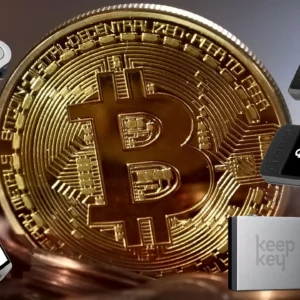Introduction
In recent years, the financial landscape has undergone significant changes driven by innovations in blockchain technology and decentralized finance (DeFi). Latin America, with its increasing adoption of cryptocurrencies, has become one of the most dynamic regions for blockchain solutions.
Leading the way is Latin American crypto exchange Ripio, which has partnered with global payments giant Visa to launch a DeFi credit card. This new offering is poised to revolutionize the way people in Latin America interact with digital assets and decentralized finance.
With the rise of blockchain-based financial services, Ripio’s DeFi credit card brings a fresh wave of possibilities to both seasoned crypto enthusiasts and everyday users looking for new financial tools.
This blog will explore the significance of Ripio’s innovative DeFi credit card, the role of Visa in this partnership, and how this collaboration is set to shape the future of crypto adoption in Latin America.

1. The Rise of Cryptocurrencies in Latin America
Over the past decade, Latin America has emerged as a hotbed for cryptocurrency adoption. With countries like Argentina, Brazil, and Venezuela leading the charge, people are turning to cryptocurrencies to combat hyperinflation, access global markets, and store value outside of traditional banking systems. Latin American crypto exchange Ripio has played a critical role in this movement by providing a secure and accessible platform for individuals to buy, sell, and store digital assets.
The growth of cryptocurrency in Latin America is partly due to the region’s unique economic conditions. Many countries in the region face high inflation rates, currency devaluation, and limited access to banking services, making cryptocurrencies an attractive alternative for financial transactions and savings. Ripio recognized this early on, launching its platform in 2013 and becoming a trusted name in the crypto community. Over the years, Ripio has expanded its offerings, from simple crypto wallets to more complex services, such as digital lending and now, the DeFi credit card.
Ripio’s DeFi credit card, developed in partnership with Visa, represents a significant step forward in the evolution of cryptocurrency in the Latin American. While digital currencies have made inroads in Latin America, there has always been a gap between cryptocurrency ownership and real-world usage.
Ripio’s DeFi credit card aims to bridge this gap by allowing users to spend their crypto assets directly, without needing to convert them into fiat currencies first. This innovation is crucial in enhancing the utility of cryptocurrencies in everyday life.
2. What is a DeFi Credit Card?
Before diving into the specifics of Ripio’s DeFi credit card, it’s essential to understand what a DeFi credit card is and how it differs from traditional credit cards. DeFi, or decentralized finance, refers to financial systems built on blockchain technology that operate without intermediaries like banks or other financial institutions. DeFi platforms allow users to borrow, lend, trade, and invest digital assets without needing to go through traditional banking systems.
A DeFi credit card, such as the one offered by Latin American crypto exchange Ripio in partnership with Visa, takes these principles and applies them to a familiar financial tool: the credit card. Unlike conventional credit cards, which rely on a centralized banking system to manage credit and transactions, a DeFi credit card operates using blockchain technology. This means that users can fund their cards with cryptocurrencies and leverage decentralized finance protocols for spending, earning rewards, and even building credit.
Ripio’s DeFi credit card is unique in that it integrates seamlessly with the company’s crypto platform. Users can link their card to their Ripio wallet, allowing them to spend their digital assets at any merchant that accepts Visa. The card uses Ripio’s technology to automatically convert crypto to fiat currency at the point of sale, making it easy for users to use their crypto for everyday purchases.
This collaboration between Visa and Ripio is groundbreaking because it merges the flexibility and innovation of decentralized finance with the widespread acceptance of traditional payment networks. As Visa is accepted by millions of merchants globally, this new DeFi credit card opens up a world of possibilities for Latin American crypto users.
3. The Role of Visa in the DeFi Credit Card
Visa’s involvement in this project is a testament to the growing importance of cryptocurrencies in the global financial ecosystem. While Visa has been exploring blockchain technology for several years, its partnership with Latin American crypto exchange Ripio for a DeFi credit card signifies a more hands-on approach in incorporating decentralized finance into its payment solutions.
Visa’s global network allows Ripio’s DeFi credit card to function smoothly across various jurisdictions and merchant platforms. Users can make payments at any store or online platform that accepts Visa, regardless of whether the merchant directly deals with cryptocurrencies in Latin American.
This eliminates one of the primary barriers for crypto adoption — the lack of widespread acceptance. By integrating with Visa’s payment infrastructure, Ripio’s DeFi credit card provides users with the convenience of using their crypto holdings without needing specialized platforms.
Visa’s role is not limited to just transaction processing. The financial giant has also been working on blockchain integration and stablecoin payments, making the partnership with Latin American crypto exchange Ripio a natural progression. Visa’s expertise in payment processing, security, and scalability complements Ripio’s innovation in the DeFi space, creating a synergy that enhances both companies’ offerings.
Furthermore, Visa’s backing adds a layer of trust and legitimacy to Ripio’s DeFi credit card. For users who may be wary of adopting new technologies like DeFi, Visa’s involvement offers reassurance that their transactions will be processed securely and efficiently, using a platform they already know and trust in Latin American.
4. Benefits and Features of Ripio’s DeFi Credit Card
The launch of Latin American crypto exchange Ripio’s DeFi credit card brings with it several compelling features and benefits that cater to both crypto enthusiasts and regular consumers.
Seamless Integration with Ripio Wallet: One of the standout features of Ripio’s DeFi credit card is its integration with the Ripio wallet. Users can easily link their digital assets stored on the Ripio platform with their credit card, allowing for instant spending without needing to convert cryptocurrencies to fiat manually. This not only simplifies the process but also enhances the card’s usability for everyday transactions in Latin American.
Real-Time Conversion: When users make a purchase with Ripio’s DeFi credit card, their cryptocurrency is converted to fiat in real-time at the point of sale. This eliminates the need for users to predict fluctuations in the crypto market and manually sell their assets beforehand. The card automatically handles these conversions, making it highly convenient for users who want to spend their crypto without worrying about exchange rates or delays.
Rewards Program: Ripio’s DeFi credit card offers a rewards program tailored to crypto users in Latin American and beyond. Instead of earning traditional points or cashback, users can earn cryptocurrency rewards, such as Bitcoin or Ethereum, every time they use their card. This incentivizes cardholders to engage more with the crypto ecosystem, potentially growing their digital asset portfolio over time.
DeFi Lending and Borrowing: One of the most innovative aspects of Ripio’s DeFi credit card is its integration with DeFi lending protocols. Users can borrow against their crypto holdings to finance purchases, enabling them to maintain their crypto investments while accessing credit. Additionally, the card allows users to earn interest on their deposits, further enhancing its appeal as a versatile financial tool.
Security and Decentralization: As a DeFi credit card, Ripio’s offering operates on decentralized finance protocols, ensuring greater transparency and security for users. Unlike traditional credit cards, which rely on centralized banks, Ripio’s card leverages blockchain technology to protect user data and transactions.
Conclusion: A Game Changer for Latin American Crypto Adoption
The partnership between Latin American crypto exchange Ripio and Visa marks a significant milestone in the evolution of cryptocurrency adoption in the region. By launching an innovative DeFi credit card, Ripio is providing users with a powerful tool that bridges the gap between digital assets and everyday financial transactions. The card offers a host of features that cater to both seasoned crypto enthusiasts and newcomers alike, combining the flexibility of decentralized finance with the global reach of Visa’s payment network.
For Latin America, where cryptocurrencies are increasingly becoming a solution to economic challenges, Ripio’s DeFi credit card represents a major advancement. By making it easier for people to spend their crypto in the real world, this partnership with Visa has the potential to accelerate mainstream crypto adoption across the region.
The future looks bright for Latin American crypto exchange Ripio as it continues to innovate and push the boundaries of what’s possible with decentralized finance. If you’re excited about the possibilities of this new DeFi credit card, we’d love to hear your thoughts. Leave a comment below and let us know how you think Ripio and Visa’s partnership will shape the future of crypto in Latin America.






